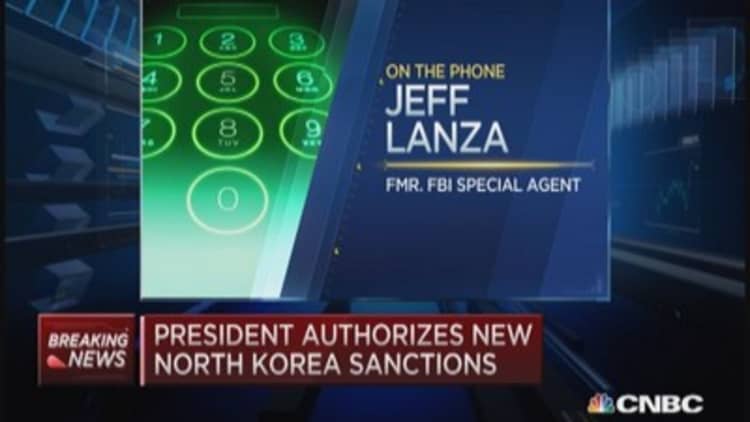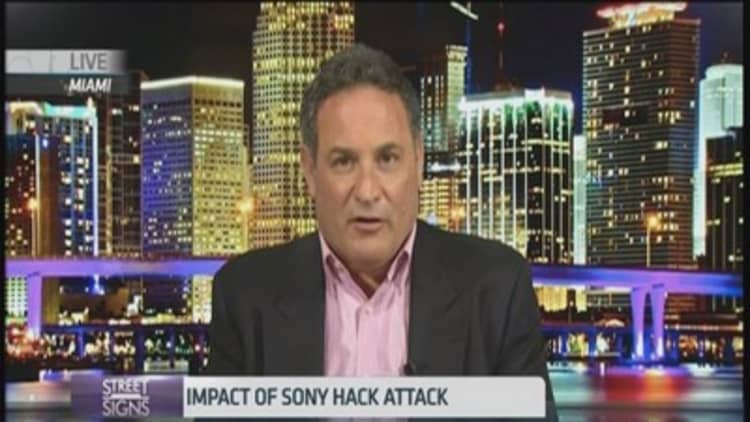
The U.S. government tightened sanctions on North Korea in retaliation for the devastating cyberattacks against Sony, the White House said Friday.
President Barack Obama issued an executive order authorizing the Treasury to impose additional sanctions on North Korea in response to "ongoing provocative, destabilizing, and repressive actions and policies, particularly its destructive and coercive cyberattack on Sony Pictures Entertainment," a White House announcement said.
The White House reiterated the president's earlier pronouncement that the U.S. response to North Korea "will be proportional, and will take place at a time and in a manner of our choosing," adding that Friday's actions are only "the first aspect" of a response.
Read MoreThe one smart way to retaliate against North Korea
Obama's executive order designated three North Korean entities to receive further sanctions. Those groups are intelligence organization Reconnaissance General Bureau, Korea Mining Development Trading Corp. (which the Treasury called the country's "primary arms dealer and main exporter of goods and equipment related to ballistic missiles and conventional weapon"), and defense industry-focused Korea Tangun Trading Corp.
The U.S. also singled out 10 North Korean government officials for sanctions, including some operating in Syria, China, Russia, Iran, and Namibia.
"Today's actions are driven by our commitment to hold North Korea accountable for its destructive and destabilizing conduct. Even as the FBI continues its investigation into the cyber-attack against Sony Pictures Entertainment, these steps underscore that we will employ a broad set of tools to defend U.S. businesses and citizens, and to respond to attempts to undermine our values or threaten the national security of the United States," Treasury Secretary Jacob Lew said in a statement.
"The actions taken today under the authority of the President's new Executive Order will further isolate key North Korean entities and disrupt the activities of close to a dozen critical North Korean operatives. We will continue to use this broad and powerful tool to expose the activities of North Korean government officials and entities," he added. The individuals were not targeted because of any involvement in the Sony cyberattack, a senior U.S. official told Reuters.
Read MoreNorth Korea's scrappy, masterful cyberarmy
Experts had previously told CNBC that sanctions were likely to have little effect against North Korea—which is already under several international penalties.
"How do you sanction the world's most heavily sanctioned country?" John Park, a Northeast Asia specialist at Harvard Kennedy School, asserted in an interview last month. "Every time you apply sanctions to a target, it forces them to innovate and get around sanctions."
Other experts had suggested in December that the U.S. government might be able to hurt the regime by attacking its international exposure—either those foreign firms operating in North Korea, or North Korean entities operating abroad.
Read More North Korea may not have hacked Sony
This may account for the sanctioning of some of the officials with business ties to other countries, including Kil Jong Hun and Kim Kwang Yon, who the Treasury described as representing "the southern African interests" of the Korea Mining Development Trading Corp.
"The financial portion is what hurts them the most," Jack Pritchard, who served as U.S. ambassador and special envoy for negotiations with the Democratic People's Republic of Korea from 2001 to 2003, told CNBC last month. "I would not underestimate the value of financial sanctions.

Questions remain, however, if North Korea was even responsible for the hacks that rocked Sony. The FBI announced last month that it had positively identified North Korean hackers as the culprits, and Obama later spoke of Pyongyang as the force behind the cyberattack without any ambiguity.
"Though the FBI has seen a wide variety and increasing number of cyber intrusions, the destructive nature of this attack, coupled with its coercive nature, sets it apart," the agency said in a December statement. "North Korea's actions were intended to inflict significant harm on a U.S. business and suppress the right of American citizens to express themselves. Such acts of intimidation fall outside the bounds of acceptable state behavior."
Still, some experts have cautioned that the federal case is weak, and that other attackers—including resentful former Sony employees—could be responsible.
The hacking, which included a message from a group calling itself the "Guardians of Peace," was allegedly initiated because of anger about a Sony comedy concerning a fictional assassination of North Korean leader Kim Jong Un. The film—"The Interview"—saw a limited theatrical release after digital threats against moviegoers' safety.


